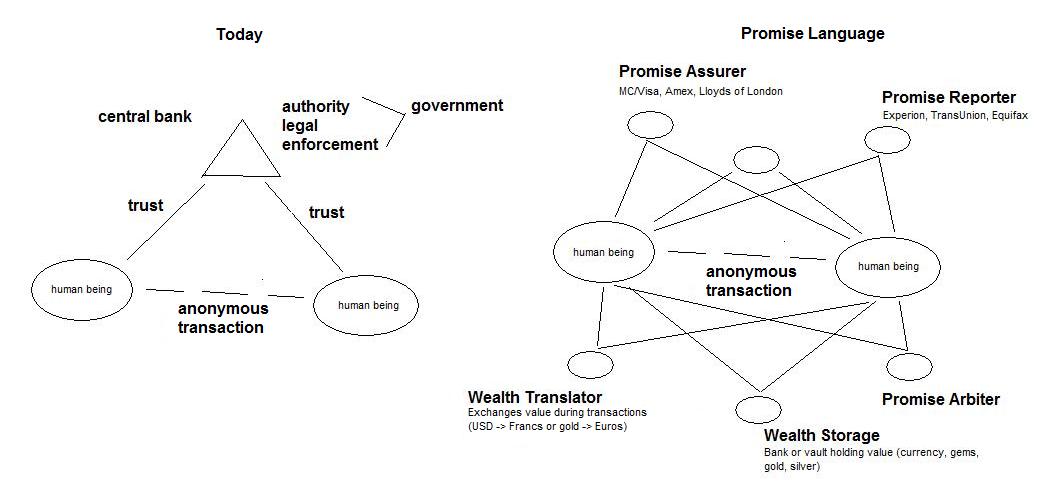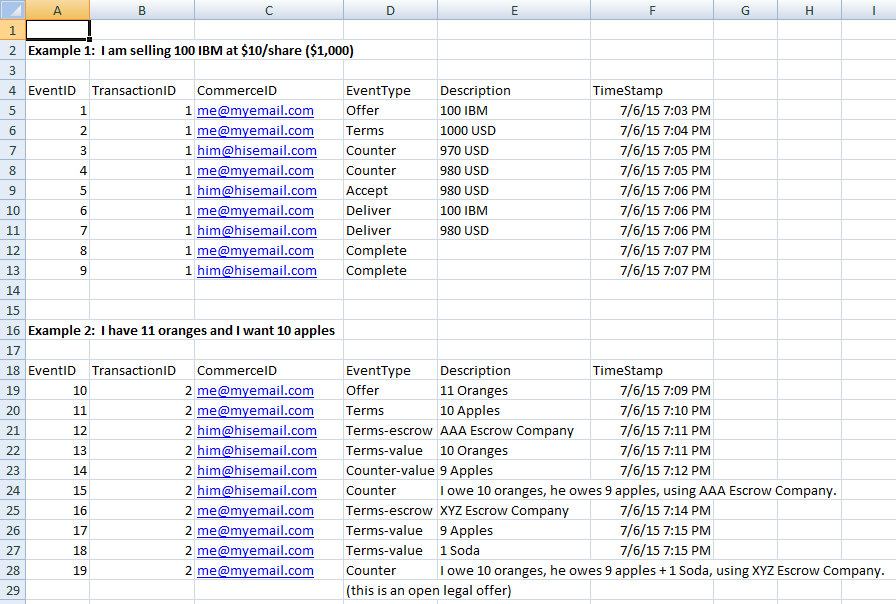- From: Andrew Bransford Brown <andrewbb@gmail.com>
- Date: Tue, 7 Mar 2017 05:35:33 -0500
- To: Evan Schwartz <evan@ripple.com>
- Cc: Didier Martin <didierphmartin@hotmail.com>, "public-interledger@w3.org" <public-interledger@w3.org>
- Message-ID: <CAPS+YFKPjacpNdanVSVrt8mLRB3qCFJO9=RN5Sz3Ak8X-47oGg@mail.gmail.com>
As someone who has done the difficult thinking on this subject for ~15 years, the protocol replaces the need for currency. The purpose of currency is to facilitate a transaction. Similarly, the purpose of a standard protocol is to facilitate a transaction. If that protocol is designed to handle ALL functions of currency, the protocol becomes the money. See attached for the 'big picture' framework. It's event-based contract law with sufficient precision for computers. Contact me with questions. ILP's existing protocols can fit within this event-based conceptual framework. It fixes money permanently. Andrew B. Brown (512) 947-8282 http://KidsCourtyard.com On Tue, Mar 7, 2017 at 4:15 AM, Evan Schwartz <evan@ripple.com> wrote: > Great question. We are definitely interested in supporting cases where the > receiver has multiple accounts on different ledgers. The main question is > what layer to address this at. > > TL;DR: I think the best way to handle this is with a "personal ledger", > and possibly supporting returning multiple addresses corresponding to the *same > ledger* on the Application Layer. > > We've discussed these different approaches to handling multi-currency > receivers: > > 1. *Interledger layer* - support "multihoming" at the lowest layer, so > you always give multiple addresses whenever you're dealing with ILP > addresses. If the different addresses correspond to different currencies > you also need to give different amounts and the sender will need to quote > all of them. This seemed overly complex and our conclusion was that at the > Interledger layer we should only be dealing with one address and one amount. > 2. *Multiple currencies on the Application layer* - SPSP or another > protocol on the same layer could return an array of addresses and > currencies, as you suggest. This brings up a similar issue as on the > Interledger layer. If you give me an array of addresses that all correspond > to a different currency (that I don't know) and I get a quote for each of > them, I have no way of knowing what a "better" price is. The sender doesn't > have an easy way of choosing which address to send to. > 3. *Dynamic response on the Application layer* - instead of the sender > choosing between different addresses, the receiver could. The receiver > could return a different ILP address depending on some parameters you > supply when querying for the receiver's details. > 4. *Personal ledger *- if you want to receive a payment through one of > a set of currencies, you need a way to determine and express the exchange > rate between them, or between them and some common unit. You could run a > "personal ledger", denominated in whatever asset you choose (or your own > units). Then you'd have a connector between your personal ledger and the > other ledgers you have accounts on. The best rate to your ledger would be > determined through normal ILP quoting. The one addition that might be > useful on the application layer is returning an array of addresses that > correspond roughly to different ways to reach your personal ledger. In > contrast to the second option, the multiple addresses would all correspond > to the same ledger/"currency", so the sender would be able to quote > multiple and choose whichever one results in a higher destination amount > (or lower source amount for them). > > I also think there's an open question as to whether having multiple > addresses qualifies for being included in the "Simple Payment Setup > Protocol", or whether that feature would be best left for another > Application Layer protocol. > > What do you think? > > On Mon, Mar 6, 2017 at 6:09 PM Didier Martin <didierphmartin@hotmail.com> > wrote: > >> Hello, >> >> >> >> As it becomes more and more current that ledgers (from some banks) >> support multicurrencies accounts, the SPSP spec shows singleton JSON >> examples. What about mutilcurrencies? Noting is mentionned about returned >> JSON arrays. Is it simply Something not part of the spec or simply >> Something forgotten to be written about? >> >> >> >> Cheers >> >> Didier PH Martin >> >> >> >> Sent from Mail <https://go.microsoft.com/fwlink/?LinkId=550986> for >> Windows 10 >> >> >> > -- > > Evan Schwartz > Software Engineer > Managing Director of Ripple Luxembourg >
Attachments
- image/jpeg attachment: PromiseLanguage.jpg

- image/png attachment: PromiseLanguage.png

Received on Tuesday, 7 March 2017 10:36:07 UTC